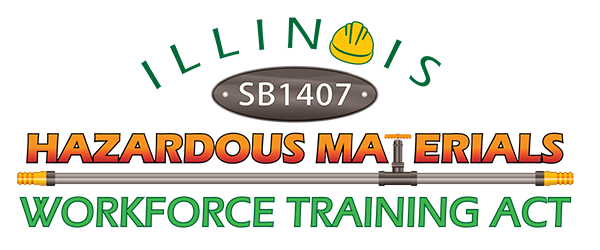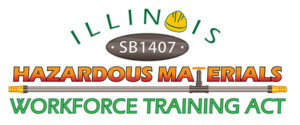SB1407 centers itself around the safety and training of workers within Illinois’ high hazard facilities as well as helping ensure the rightfully assumed protection of Illinois residents. But because it affects the labor pool, facility owners, operating expenses, profits and potentially wages there are obviously a lot of points of contention. Below are some helpful answers to commonly asked questions and potential misrepresentations surrounding SB1407.
Tell your legislators to support SB1407!
Below are some helpful answers to commonly asked questions and potential misrepresentations surrounding SB1407.
What is the main goal of SB1407?
SB1407 calls for the development of an approved advanced safety training of all contractors and subcontractors to achieve a skilled and trained workforce to perform on site work at Illinois’ high hazard facilities.
Isn’t this bill just all about organized labor using state government to mandate use of their services?
If the training is mandated to be available to everyone through the IL Department of Labor, community colleges and/or US Department of Labor approved apprenticeship programs, how can it be exclusive to organized labor?
1. It’s true, organized labor has always invested in the ongoing safety training of their members, so they have no issue with advanced safety training requirements.
2. Opponents of this bill would rather be allowed to hire the cheapest labor, regardless of their qualifications, to maintain profit margins…often at the expense of workers’ and residents’ safety. Don’t be misled by a cry for equality in hiring, nothing could be further from the issue.
This bill is about ensuring the safest possible workforce at Illinois’ high hazard facilities. Attempts to mislead the public of another agenda are just that!
How will SB1407 affect me personally as a resident of Illinois?
Incidents at high-hazard facilities can have far reaching impacts beyond the facility and on-site workers. EPA fines and settlements from major facilities document the chaos unleashed on our communities when incidents occur at these facilities.
Who is the Construction Fairness Alliance (CFA)?
The CFA “is a cooperative consisting of pro-worker, pro-free enterprise proponents in the Illinois construction industry”, which sounds wholesome and straight-forward enough. But, how can they be against the IL Department of Labor (IDOL) being required by rule to develop a curriculum of approved safety training for ALL contractors and subcontractors used at high-hazard facilities in Illinois? What is so dangerous to their interests in having a consistent, advanced safety training requirement?
Admittedly, it would reduce the pool of available contractors and subcontractors they could employ to only those who meet an advanced safety standard of training. Training anyone in their current pool could take and potentially pass, but it is true they may want to earn a bit more for their earned training and advanced skill set…just like any other profession. So, it makes sense why a co-operative of free-enterprise proponents might want to avoid advanced safety training requirements to broaden their available worker pool to its lowest potential wages.
What about claims the workforce is already safety trained and this bill would actually reduce safety?
The Construction Fairness Alliance claims “construction companies must complete safety training through Three Rivers Manufacturers’ Association (TRMA) in order to work at many of the petrochemical refineries and chemical facilities in the Three Rivers area (Joliet).”
1. “Many” is not all, in fact it’s a conveniently ambiguous measure. We are asking for a bill to remove ambiguity. Why not require ALL contractors and subcontractors be required to have approved advanced safety training? After all, in a high-hazard facility even one small mistake can have life ending results.
2. If TRMA trains “many” construction companies to work in “the Three Rivers area (Joliet)”, what about all the other workers in Joliet and the rest of the state? SB1407 is about safety for ALL of Illinois, not just Joliet.
3. This doesn’t address the multitude of contractors and subcontractors who come into Illinois from other states to work at our high hazard facilities – what about their advanced safety training?
Understandably, opponents of this bill can’t offer any evidence of how the bill would actually reduce safety.
What about the CFA’s position of “Fairness and Opportunity for Illinois Construction Workers”?
Where does a required level of safety training for workers at high hazard facilities available to everyone limit fairness or opportunity? If their complaint is the lack of jobs remaining available for under-skilled and under-trained contractors and subcontractors at high hazard facilities…well there you’ve got us!
Where is their concern for the fairness and opportunity Illinois residents should feel living amongst or nearby our state’s high hazard facilities?
What about claims the bill will reduce the “already-too-small pool of highly-trained, highly-skilled craftspeople available” in Illinois?
1. If the current workers have the correct safety training it would not affect them, but if they don’t wouldn’t you want them to be required to get it?
2. The bill doesn’t mandate amounts of workers in any way. It only makes requirements on the advanced safety training of EVERY individual worker at our high hazard facilities.
3. If the pool of available workers will be reduced because it is deemed some of the current contractors and subcontractors are inadequately trained to work at our high hazard facilities…isn’t that a good thing?! It doesn’t blacklist or prevent those workers from taking the required safety curriculum at any available facility.

